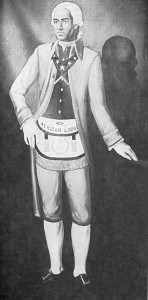65
Rachel Levi
Prince Hall was among the most noteworthy Citizens of Boston during the revolutionary period, where little was known of him beforehand. He was the founder of the African Lodge of Honorable Society of Free and Accepted Masons of Boston, the worlds first black Freemasonry and the first society in America dedicated on social, political and economic improvement.
Born in 1735 (although other sources say 1748) in Barbados, he was eventually brought to Boston as the Slave of William Hall. In 1756 his son Primus was born to another servant of a different household, Delia. In 1762 Hall joined the Congregational church and soon after married Sarah Ritchie, another enslaved woman. Following her death, which occurred eight years later, he married Flora Gibbs of Gloucester.
A month after the Boston Massacre William Hall freed Prince. He was no longer a slave but accounted as a free man where he made his living as a peddler, caterer and leather dresser. He was listed as a voter and taxpayer. He owned a house and a leather workshop in Boston.
He was thought to have conceivably taken part in the revolution fighting at Bunker Hill being one of the six Prince Hall’s listed on military records.
In 1775 Hall joined a British army lodge of Masons stationed in Boston. Accompanying him were 14 other free black men, and when the British departed they formed their own lodge, African Lodge Number 1. Twelve years later they became a permanent charter, Hall being its first Grand Master.
Hall used his position as “Worshipful Master” of the black Masons to speak out against slavery and the denial of black rights. He protested the lack of schools for black children until he finally established one of his own. His protest later became a basis for abolition of slavery and fighting for black rights.
Prince Hall died in 1807 at 72. A year after his death his lodge honored him by changing its name to Prince Hall Grand Lodge.
Works Cited
“People & Events Prince Hall.” PBS. PBS, n.d. Web. 02 Nov. 2015.
“Summary of Prince Hall, the Pioneer of Negro Masonry. Proofs of the Legitimacy of Prince Hall Masonry.” Summary of Prince Hall, the Pioneer of Negro Masonry. Proofs of the Legitimacy of Prince Hall Masonry. N.p., n.d. Web. 02 Nov. 2015.

